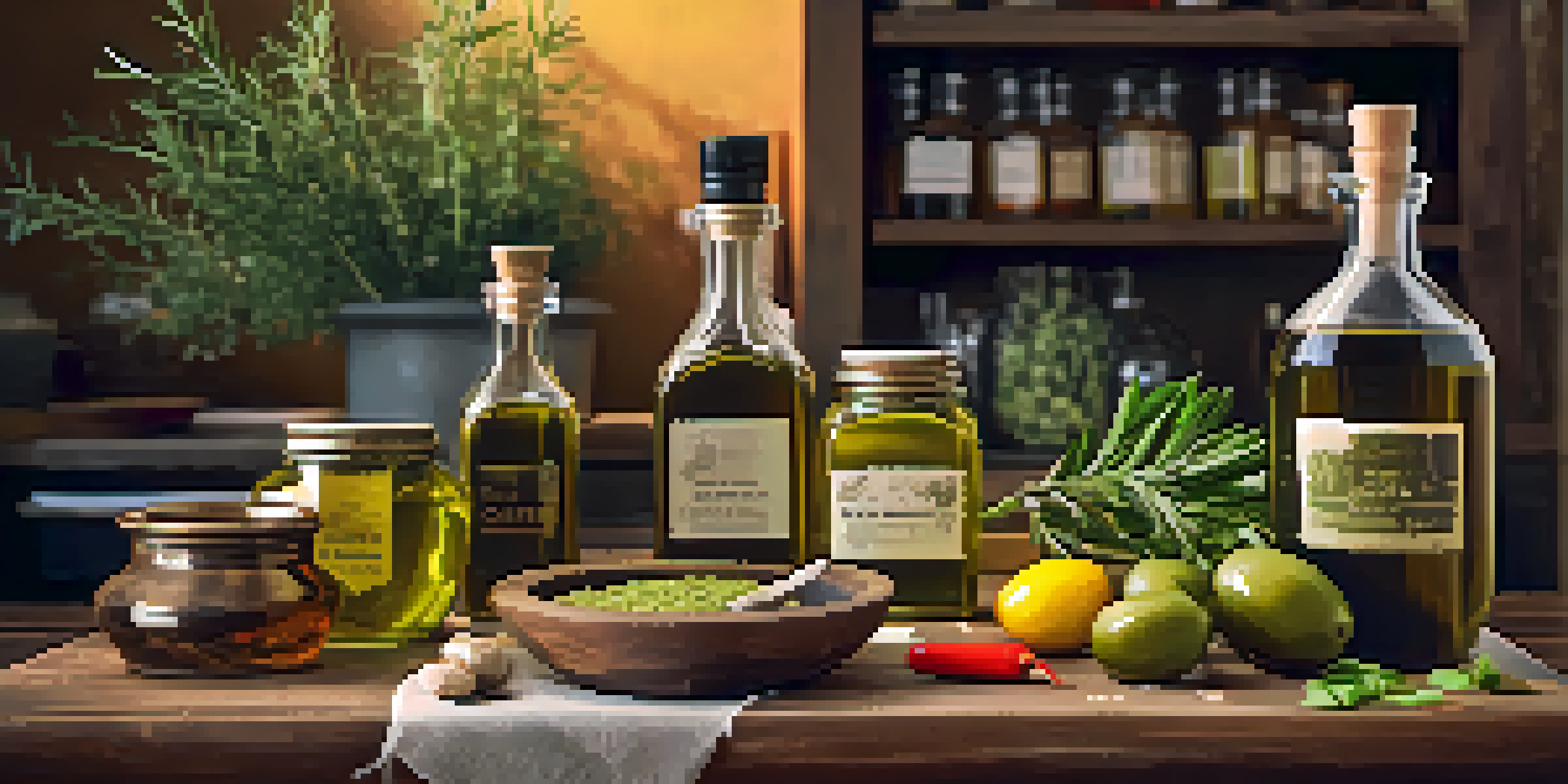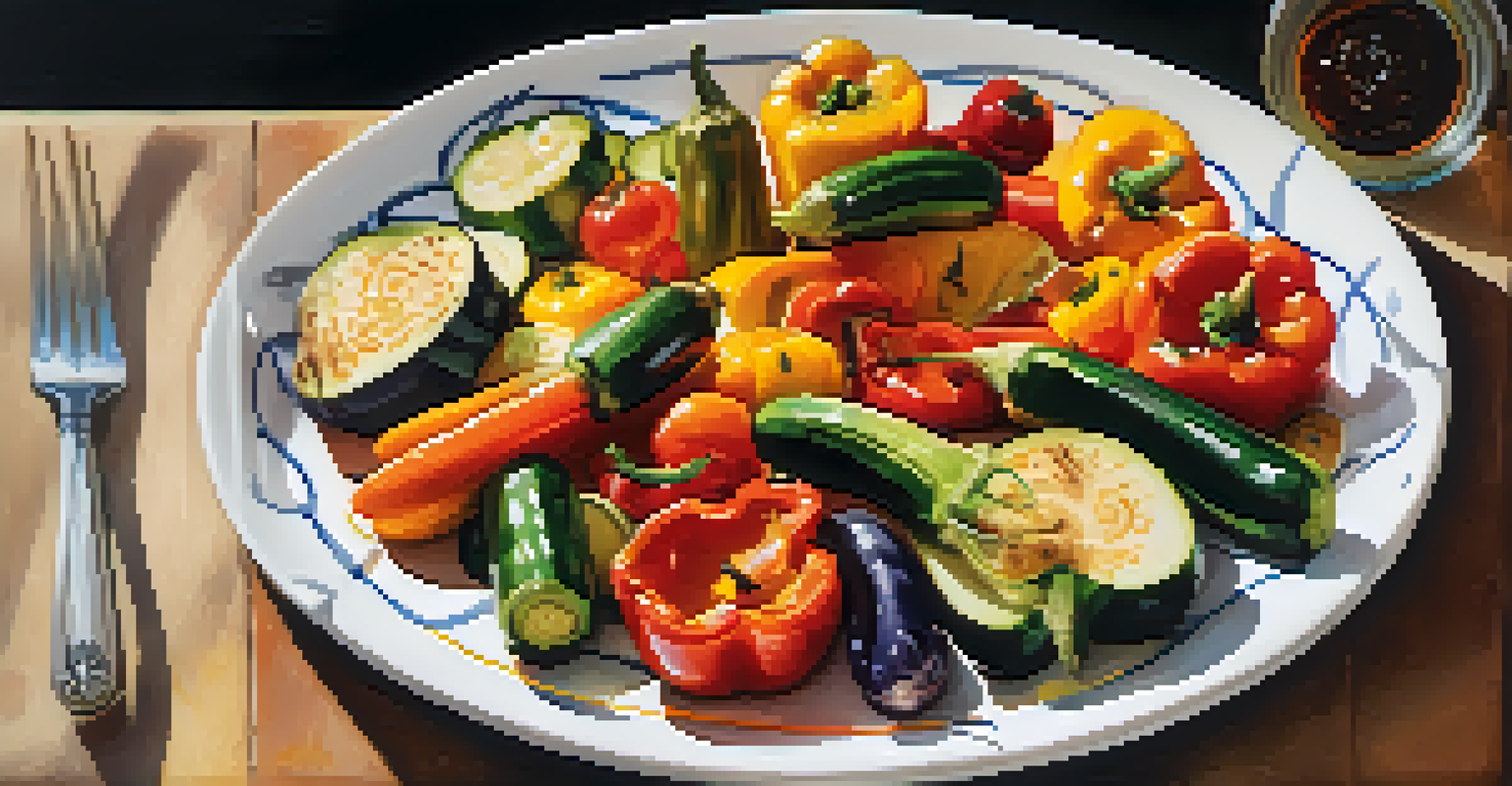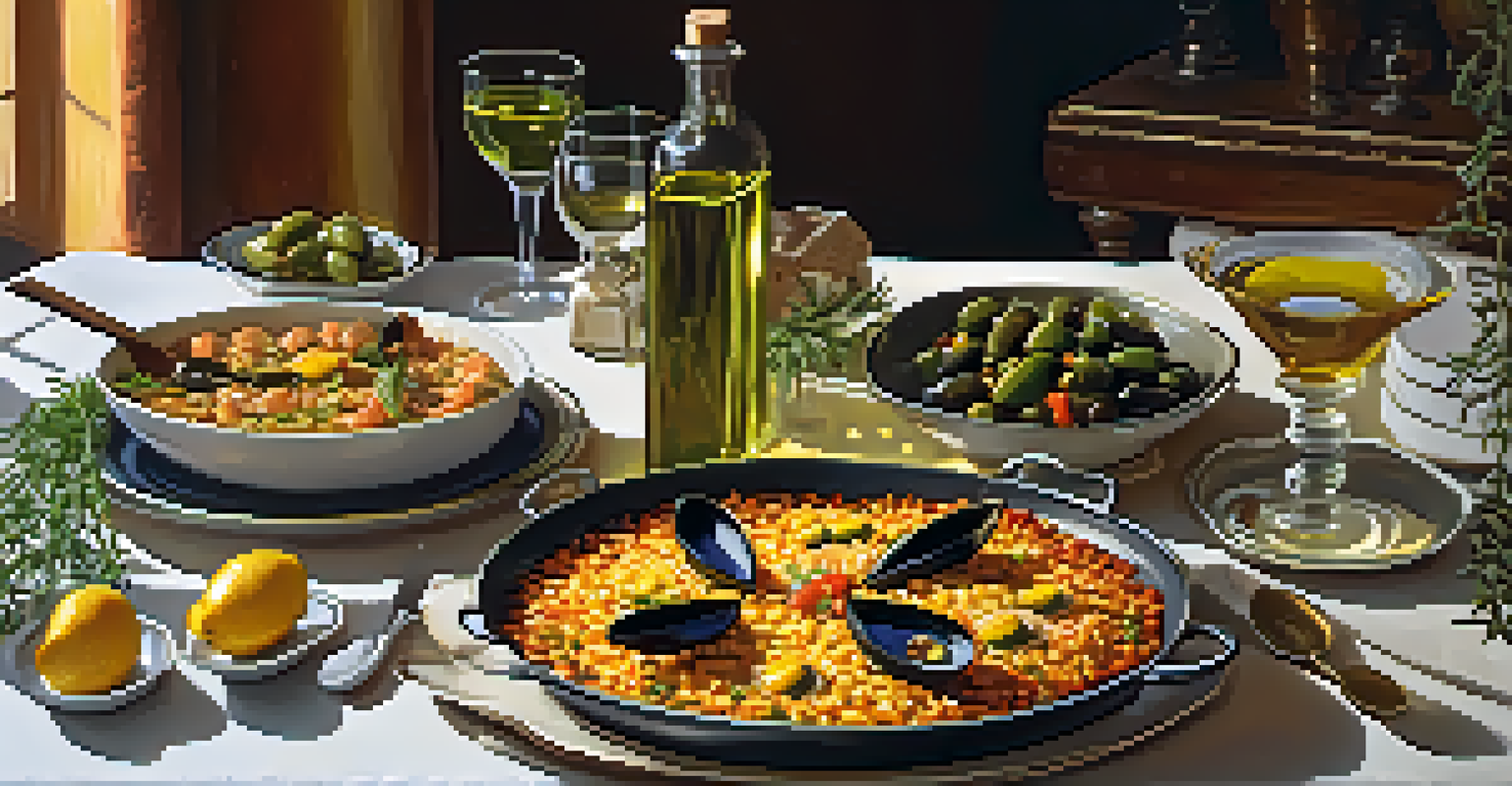Olive Oil: The Heart of Spanish Cooking and Its Varieties

The Role of Olive Oil in Spanish Cuisine
Olive oil is more than just an ingredient in Spain; it's a way of life. It serves as the foundation for many traditional dishes, from paella to tapas. The rich flavors of Spanish cuisine are often attributed to the quality of its olive oil, making it indispensable in both home kitchens and gourmet restaurants.
Olive oil is the liquid gold of the Mediterranean diet.
In Spain, olive oil is used for cooking, drizzling, and even as a dipping sauce. This versatile oil enhances the taste of vegetables, meats, and seafood, allowing the natural ingredients to shine. Think of it as the glue that holds many Spanish dishes together, bringing harmony to flavors.
Moreover, the cultural significance of olive oil in Spain cannot be overstated. It is often a centerpiece in family meals, symbolizing health, tradition, and community. Sharing dishes drizzled with high-quality olive oil fosters connection and enjoyment, making every meal a celebration.
The History of Olive Oil in Spain
Olive oil has deep roots in Spanish history, dating back thousands of years. The Phoenicians and Romans were among the first to cultivate olive trees in the Iberian Peninsula, setting the stage for a thriving industry. Today, Spain is the largest producer of olive oil in the world, a title it has held for centuries.

The techniques for producing olive oil have evolved over time, blending ancient methods with modern technology. This evolution has allowed for a wider variety of oils, each with unique flavors and characteristics. The passion for quality olive oil continues to be a point of pride for many Spanish families and producers.
Olive Oil: Essential in Spanish Cooking
Olive oil is a fundamental ingredient in Spanish cuisine, enhancing the flavor of dishes and symbolizing tradition and community.
As we explore Spain's olive oil heritage, it’s important to recognize the connection between the land and its oil. Regions such as Andalusia and Catalonia are known for their distinct varieties, each influenced by the local climate and soil. This rich history contributes to the diverse spectrum of flavors that olive oil enthusiasts cherish.
Understanding Different Olive Oil Varieties
Not all olive oils are created equal, and understanding the different varieties can enhance your culinary experience. The primary types include extra virgin, virgin, and refined olive oil, each varying in quality and flavor. Extra virgin olive oil, for example, is made from the first cold pressing of olives, resulting in a robust taste and higher antioxidant levels.
The olive tree is surely the richest gift of heaven.
In addition to these main categories, there are also numerous regional varieties that reflect the unique characteristics of the olives used. For instance, Picual, Hojiblanca, and Arbequina are popular Spanish cultivars, each bringing its own flavor profile to dishes. Exploring these varieties can be a delightful journey for your taste buds.
When selecting olive oil, consider the flavor notes that best complement your cooking needs. A peppery oil might be perfect for drizzling over grilled vegetables, while a mild oil can enhance a delicate fish dish. Understanding these subtle differences allows you to elevate your cooking and truly appreciate the heart of Spanish cuisine.
Health Benefits of Olive Oil
Olive oil is often hailed as a superfood, and for good reason. Packed with monounsaturated fats, it can help reduce bad cholesterol levels, promoting heart health. Additionally, olive oil is rich in antioxidants, which can combat inflammation and support overall well-being.
Incorporating olive oil into your diet is a simple and delicious way to boost your health. Whether you use it in salad dressings, marinades, or cooking, the benefits are numerous. Research has shown that regular consumption of olive oil can lower the risk of chronic diseases, making it an essential component of the Mediterranean diet.
Diverse Varieties Enhance Culinary Use
Understanding the different varieties of olive oil, like extra virgin and regional cultivars, can elevate your cooking and flavor experiences.
However, it's important to choose high-quality olive oil to reap these benefits. Look for oils labeled as 'extra virgin' and check for certifications to ensure purity. By making informed choices, you can enjoy the health benefits of olive oil while savoring its delightful flavors.
How to Use Olive Oil in Cooking
Using olive oil in your cooking can elevate your dishes from ordinary to extraordinary. It’s versatile enough for sautéing, drizzling, and even baking. For example, a splash of olive oil can enhance the flavor of roasted vegetables or serve as a base for a zesty vinaigrette.
When cooking at high temperatures, it's advisable to use refined olive oil, as it has a higher smoke point. However, for finishing touches, nothing beats the rich flavor of extra virgin olive oil. Imagine drizzling it over a warm bowl of pasta or a freshly baked loaf of bread; the results are simply divine.
Experimenting with olive oil in your cooking can also lead to exciting flavor combinations. Try infusing olive oil with herbs or spices to create a unique drizzle for your dishes. The possibilities are endless, inviting creativity into your kitchen while celebrating the heart of Spanish cooking.
Storing Olive Oil for Maximum Freshness
To enjoy the full flavor and health benefits of olive oil, proper storage is essential. Exposure to light, heat, and air can degrade the quality of olive oil over time. Ideally, it should be stored in a dark glass or stainless steel container, away from direct sunlight and extreme temperatures.
A cool, dark cupboard is often the best spot for your olive oil. Avoid storing it near the stove, as the heat from cooking can negatively impact its freshness. If you buy olive oil in bulk, consider transferring it to smaller bottles for everyday use to minimize exposure to air.
Health Benefits of Quality Olive Oil
Incorporating high-quality olive oil into your diet offers numerous health benefits, including heart health and reduced inflammation.
Additionally, always seal your olive oil tightly after use. If you notice any off smells or flavors, it might be time to replace it. By taking these simple steps, you can ensure that your olive oil remains at its best, ready to enhance your cooking whenever inspiration strikes.
Pairing Olive Oil with Spanish Dishes
Pairing olive oil with the right dishes can elevate your culinary experience to new heights. For instance, a robust, peppery olive oil complements the flavors of grilled meats beautifully, while a milder oil might be better suited for seafood. Understanding these pairings can help you create well-balanced meals.
In traditional Spanish cuisine, olive oil is often paired with simple ingredients to enhance their natural flavors. Think of a fresh tomato salad drizzled with fruity extra virgin olive oil, or crusty bread dipped in a mixture of oil and balsamic vinegar. These pairings showcase the beauty of olive oil as a key player in Spanish cooking.

Don't hesitate to experiment with different varieties of olive oil to find which ones resonate with your palate. Hosting a tasting party with friends can be a fun way to explore flavors and discover new pairings. Ultimately, the joy of cooking lies in the exploration and appreciation of ingredients like olive oil.